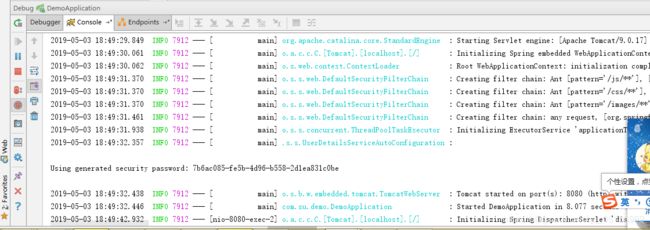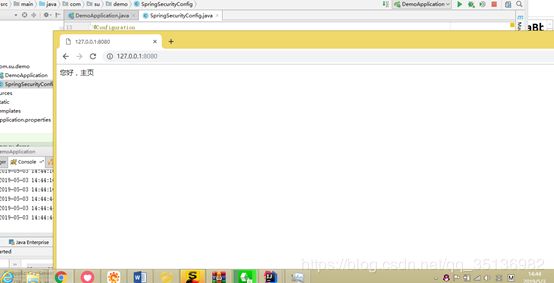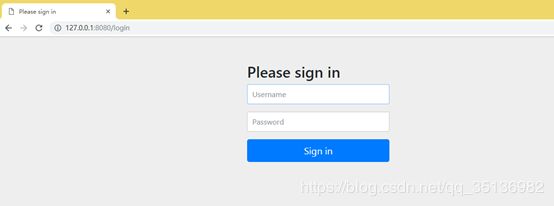Spring Security权限框架
目录
为什么需要权限管理?
权限管理的核心是什么?
权限框架主要有?
Spring Security
Spring Security实战
1.搭建springbooot环境
2.只要能登录即可的例子
2.基于内存的权限设置
3.角色进行拦截
为什么需要权限管理?
- 安全性:误操作,人为破坏,数据泄露等
- 数据隔离:不同权限能看到及操作不同的数据
- 明确职责:运营,客服等不同角色,等级不同
权限管理的核心是什么?
1.用户-权限:人员少,功能固定,或特别简单的系统
2.RBAC:用户-角色-权限 所有系统都适用
权限框架主要有?
1. Spring Security
2.apache shiro
本博客主要讲Spring Security
Spring Security
主要是认证和验证
Basic 认证:Basic 认证是HTTP 中非常简单的认证方式,因为简单,所以不是很安全,不过仍然非常常用。
Digest 认证:客户端请求资源->服务器返回认证标示->客户端发送认证信息->服务器查验认证,如果成功则继续资源传送,否则直接断开连接。
x.509认证:数字认证
LDAP 认证:LDAP认证是通过WSS3.0加上轻量目录LDAP协议搭建的种认证方式,使用https加密传输,主要用于做文档管理。
From 认证:表单认证
下面使用springboot+Spring Security 实战下
Spring Security实战
1.搭建springbooot环境
https://start.spring.io/ 搭建springboot网站,选择如下两个依赖,我这里使用1.5.6.RELEASE的springboot
搭建好了之后下载下来解压,导入IDEA 中
运行项目,能成功启动即可,如下不报错,就说明这个工程没有问题。
2.只要能登录即可的例子
在主程序DemoApplication 中编写两个方法,一个是用来访问主页用( home()),一个是需要登录才能访问(hello())
package com.su.demo;
import org.springframework.boot.SpringApplication;
import org.springframework.boot.autoconfigure.EnableAutoConfiguration;
import org.springframework.boot.autoconfigure.SpringBootApplication;
import org.springframework.web.bind.annotation.RequestMapping;
import org.springframework.web.bind.annotation.RestController;
@SpringBootApplication
@RestController
@EnableAutoConfiguration
public class DemoApplication {
public static void main(String[] args) {
SpringApplication.run(DemoApplication.class, args);
}
@RequestMapping("/")
public String home() {
return "您好,主页";
}
@RequestMapping("/hello")
public String hello() {
return "hello路径";
}
}
新建一个方法SpringSecurityConfig ,主要是用户进行权限设置的
package com.su.demo;
import org.springframework.context.annotation.Configuration;
import org.springframework.security.config.annotation.web.builders.HttpSecurity;
import org.springframework.security.config.annotation.web.builders.WebSecurity;
import org.springframework.security.config.annotation.web.configuration.EnableWebSecurity;
import org.springframework.security.config.annotation.web.configuration.WebSecurityConfiguration;
import org.springframework.security.config.annotation.web.configuration.WebSecurityConfigurerAdapter;
/**
*主要是权限配置
*/
@Configuration
@EnableWebSecurity
public class SpringSecurityConfig extends WebSecurityConfigurerAdapter {
/**
* 拦截下面的东西
*
* @param http
* @throws Exception
*/
@Override
protected void configure(HttpSecurity http) throws Exception {
http.authorizeRequests()
.antMatchers("/").permitAll() //主路径允许访问
.anyRequest().authenticated() //验证
.and()
.logout().permitAll() //注销也是运行访问
.and()
.formLogin();
http.csrf().disable(); //关闭csrf() 认证
}
/**
* 不拦截下面这些资源
*
* @param web
* @throws Exception
*/
@Override
public void configure(WebSecurity web) throws Exception {
web.ignoring().antMatchers("/js/**", "/css/**", "/images/**");
}
}
运行程序,效果:运行/ 允许访问 ,运行/hello 是需要被拦截的
2.基于内存的权限设置
在方法SpringSecurityConfig 中添加代码
/**
* 基于内存的验证:不需要用到数据库的情况
*
* @param auth
* @throws Exception
*/
@Override
protected void configure(AuthenticationManagerBuilder auth) throws Exception {
//我们指定一个人这个人的用户:admin 密码:123456 角色:ADMIN
auth.inMemoryAuthentication().passwordEncoder(new BCryptPasswordEncoder()).withUser("admin").password(new BCryptPasswordEncoder().encode("123456")).roles("ADMIN");
}
当访问http://localhost:8080/hello 我们需要输入存在内存中的用户名密码
3.角色进行拦截
在方法DemoApplication 中添加代码
@EnableGlobalMethodSecurity(prePostEnabled = true)//只有ADMIN 的角色才能访问
/**
* 只有ADMIN 的角色才能访问
* @return
*/
@PreAuthorize("hasRole('ROLE_ADMIN')")//必须用ROLE_xxx 才能识别你是做角色权限
@RequestMapping("/roleAuth")
public String role () {
return "需要某个权限才能访问";
}
运行,当访问http://localhost:8080/roleAuth 时只有角色为ADMIN 的用户才能访问







